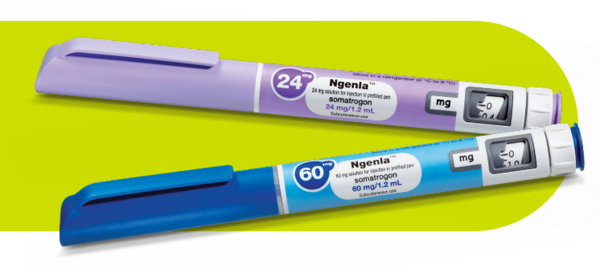Pfizer's growth hormone deficiency treatment Ngenla (ingredient: somatrogon), which the U.S. Food and Drug Administration (FDA) disapproved a year earlier, has obtained approval from the Ministry of Food and Drug Safety.

Growth hormone deficiency is a rare disease that affects children and adults. In the case of children, there are problems with growth and development, and in adults, it causes a decrease in muscle mass, an increase in fat, and an increase in cholesterol levels.
The standard treatment is the periodic administration of human growth hormone.
Pfizer is already marketing Genotropin (ingredient: somatropin) in Korea after receiving approval in 2001.
However, as Ginotropin is a once-a-day subcutaneous injection in six or seven doses over a week, Pfizer developed a once-weekly formulation, Ngenla, to improve user convenience.
The latest permit was based on a phase-3 study that confirmed non-inferior effects compared to Ginotropin for 12 months in 224 pre-pubescent children with growth hormone deficiency.
In the study, the patients were randomly assigned to the once-weekly Ngenla group (0.66 mg/kg/week) and the Ginotropin group (0.034 mg/kg/day).
As a result of evaluating the annual height velocity, at 12 months, the Ngenla administration group was 10.10 cm/year, and the somatropin administration group was 9.78 cm/year.
Changes in height standard deviation scores (SDS) at six months and 12 months of the Ngenla group and the Ginotropin group showed similar levels.
In a multicenter, multinational crossover study on the treatment burden of pediatric growth hormone deficiency patients, Ngenla showed a significantly lower treatment burden compared to Ginotropin.
The study showed that Ngenla was a preferred treatment option for patients and their guardians by increasing the satisfaction of the treatment experience.
The approval comes after the FDA rejected the approval of Ngenla last year.
The FDA received Ngenla's biologics license application (BLA) in January 2021, and the approval review deadline was set for October 2021.
However, after extending the review period by three months, the FDA denied Ngenla's approval in January 2022.
As the FDA's response was not fully disclosed, the specific reason for the disapproval was unknown.
During that time, Pfizer had said that it planned to apply for FDA approval once again by submitting additional data.
Aside from the U.S., the treatment has received approval in Japan, Canada, Australia, and, most recently, the EU in February of last year.

